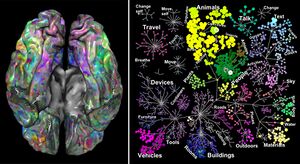8A Geometry - Perceived exposure to semantic concept network
8A geometry is one of the two potential final levels of visual geometry; the other is 8B geometry.
A level 8A experience can be described as the feeling of being exposed to a seemingly infinite mass of geometry comprised entirely of innately comprehensible representations which are perceived to simultaneously convey every internally stored concept, memory, process, and neurological structure stored within the mind. This experience is not just perceived through visual geometric data, but is also felt in an incomprehensible level of detail that manifests in the form of complex cognitive and physical sensations. These sensations are felt to convey an equal amount of innately understandable information as that of which is also experienced through a person's vision.
At the lower end of level 8A this effect is something that fluctuates wildly and is neither constant nor consistent in its intensity. Instead, it is momentarily triggered by the experience of a concept. For example, if someone were to say the word "Internet" to a person who is currently undergoing this state they would see the mind's concept of the Internet immediately manifested in a geometric form amidst the very center of their visual field. This form will then quickly branch out from itself in a manner which is similar to a spider diagram or mind map chart, such as a network of geometric nodes descending from an origin concept where each node in the network is directly associated with their parent node, but with each degree of separation from the origin reducing the level of association with the source concept. For example, with the origin concept "Internet" one may have dozens of immediate child nodes that are representative of computers, which may have associated descendant nodes involving technologies, which may have their own children which represent human intelligence, which may also have child nodes involving all concepts related to the evolution of humanity, and so on until all concepts known to the person are represented within the network.
Once this occurs the sensory overload can temporarily disconnect one from their external environment and result in simultaneous long-term memory suppression or "ego death" for several seconds to a minute before a person is returned to reality until something triggers the process again, usually immediately. It is worth noting, however, that at this level it can to a certain extent be disabled through continuous physical movement. This seems to be because movement stops the process from branching out into everything by not giving the effect the time it needs to lock onto a concept.
As the dose of the psychoactive substance is increased, the process becomes easier to trigger while extending its length and duration. This eventually results in a stable state of complete disconnection from the external environment alongside of sustained "ego death" and a lasting sense which is often interpreted as experiencing all of existence in a single instant.
The experience of this effect is most common under the influence of very heavy dosages serotonergic psychedelics. However, there are particular attributes of certain psychedelics which tend to result a higher likelihood of level 8B over level 8A and vice versa. Psychedelics which are stimulating in physical effects and contain low amounts of hallucinatory content usually result in level 8A. For example, psychedelics which contain these attributes include LSD, 2C-B and 4-HO-MET. In contrast, psychedelics which lead to level 8B are typically sedating in physical effects and contain high amounts of hallucinatory content. For example, psychedelics which contain these attributes include psilocin, DMT and 2C-C.
Psychoactive substances
Compounds within our psychoactive substance index which may cause this effect include:
Experience reports
Anecdotal reports which describe this effect within our experience index include:
